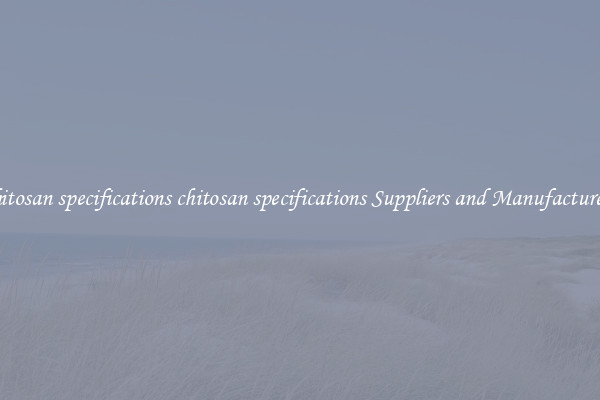chitosan specifications chitosan specifications Suppliers and Manufacturers
Chitosan is a biopolymer derived from chitin, a natural polymer found in the exoskeleton of crustaceans like crabs and shrimp. It has a wide range of applications in industries such as food, pharmaceuticals, cosmetics, and agriculture, due to its unique properties such as biocompatibility, biodegradability, antimicrobial activity, and non-toxicity.

Chitosan specifications are important for ensuring the quality and performance of the product. Suppliers and manufacturers of chitosan must adhere to certain specifications to meet the requirements of their customers. Some of the key specifications for chitosan include:
- Degree of deacetylation: This refers to the percentage of acetyl groups that have been removed from chitin to form chitosan. The degree of deacetylation affects the properties of chitosan, such as its solubility, viscosity, and antimicrobial activity. Generally, chitosan with a higher degree of deacetylation is considered to be more effective in certain applications.
- Molecular weight: The molecular weight of chitosan can also influence its properties and performance. Higher molecular weight chitosan is often preferred for applications requiring greater viscosity or bioactivity, while lower molecular weight chitosan may be more suitable for applications where rapid solubility is desired.
- Purity: Chitosan should be highly pure to ensure its quality and safety. Impurities such as residual proteins, heavy metals, and endotoxins can affect the performance of chitosan and may pose risks to human health. Suppliers and manufacturers must adhere to strict quality control measures to ensure the purity of their chitosan products.
- Particle size: Chitosan is available in various particle sizes, ranging from fine powders to larger flakes or granules. The particle size of chitosan can impact its dispersibility, handling, and performance in different applications. Manufacturers typically offer chitosan in different particle size ranges to meet the requirements of their customers.
- Source: Chitosan can be derived from different sources, such as shrimp shells, crab shells, or fungal sources. The source of chitosan can influence its properties and performance, so suppliers and manufacturers must specify the source of their chitosan products to provide transparency to customers.
Overall, chitosan specifications are important for ensuring the quality and performance of chitosan products in various applications. Suppliers and manufacturers must adhere to these specifications to meet the needs and expectations of their customers and promote the use of chitosan as a versatile and sustainable biopolymer.

View details

View details

View details

View details








